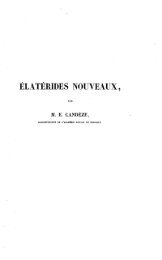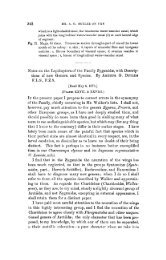- Page 1 and 2:
STORAGE-ITE'^iMAIN'-P9-Q30BU.B.C. L
- Page 5:
J( K/. ^ /.THE MALAY AECHIPELAGO
- Page 11:
TOCHARLES DARWINAUTHOR OF ''THE ORI
- Page 14:
PREFACE TO THE FIRST EDITIONMy read
- Page 18 and 19:
—XPKEFACEhave known where they we
- Page 20 and 21:
xiiPREFACEgenerally employed one or
- Page 22 and 23:
XIVCONTEXTSTHE MOLUCCASCHAP.PAGEXIX
- Page 25:
LIST OF ILLUSTRATIOXSxviiMAPSMap sh
- Page 29 and 30:
;THE MALAY AECHIPELAGO.CHAPTEK I.PH
- Page 31 and 32:
I.] PHYSICAL GEOGRAPHY. 5miles off,
- Page 33 and 34:
I.] PHYSICAL GEOGRAPHY. 7there is a
- Page 35:
-I ^ D £*• '*-'*;0«r*'-'?rif5af
- Page 38 and 39:
10 THE MALAY ARCHIPELAGO. [chap.the
- Page 40 and 41:
12 THE MALAY ARCHIPELAGO. [chap.thr
- Page 42 and 43:
14 THE MALAY ARCHIPELAGO. [chap.the
- Page 44 and 45:
16 THE MALAY ARCHIPELAGO. [chap.CHA
- Page 46 and 47:
118 THE MALAY AECHIPELAGO. [chap.To
- Page 48 and 49:
—20 THE MALAY ARCHIPELAGO. [chap.
- Page 50 and 51:
22 THE MALAY ARCHIPELAGO. [chap.bel
- Page 52 and 53:
24 THE MALAY ARCHIPELAGO. [chap.hav
- Page 54 and 55:
26 THE MALAY ARCHIPELAGO. [chai-.tr
- Page 56 and 57:
28 THE MALAY ARCHIPELAGO. [chap.are
- Page 59 and 60:
IV.] BORNEO—THE ORANG-UTAN. 29som
- Page 61 and 62:
IV.] BORNEO—THE ORANG-UTAN. 31hun
- Page 63 and 64:
IV.] BORNEO—THE ORANG-UTAN. 33vai
- Page 65 and 66:
IV.] BORXEO—THE ORAXG-UTAN. 35aft
- Page 67 and 68:
IV.] BORNEO—THE ORANG-UTAK 37and
- Page 69 and 70:
IV.] BORNEO—THE ORANG-UTAN. 39rou
- Page 71 and 72:
IV.] BORNEO—THE ORAXG-UTAX. 41our
- Page 73 and 74:
IV. 1BORNEO—THE ORANG-UTAK 43the
- Page 75 and 76:
i\-.l BORNEO—THE ORANG-UTAX. 45No
- Page 77 and 78:
,IV.] BORNEO—THE ORAXG-UTAX. 47My
- Page 79 and 80:
v.] BORNEO—JOURNEY IN THE INTERIO
- Page 81 and 82:
;v.] BORXEO—JOURXEY IX THE IXTERI
- Page 83 and 84:
v.] BORNEO—JOURNEY IN THE INTERIO
- Page 85 and 86:
v.] BORNEO—JOURNEY IN THE INTERIO
- Page 87 and 88:
—v.] BORNEO—JOURNEY IN THE INTE
- Page 89 and 90:
v.] BORNEO—JOURNEY IN THE INTERIO
- Page 91 and 92:
v.] BORNEO—JOURNEY IN THE INTERIO
- Page 93 and 94:
v.] BORNEO—JOURNEY IN THE INTERIO
- Page 95 and 96:
v.] BORNEO—JOURNEY IN THE INTERIO
- Page 97 and 98:
VI.] BORNEO—THE DYAKS. 67dark pal
- Page 99 and 100:
VI.] BORXEO—THE DYAKS. 69some fru
- Page 101 and 102:
VI. 1BORNEO—THE DYAKS. 71vices, n
- Page 103 and 104:
VII.] JAVA. 73placed a Dutch Reside
- Page 105 and 106:
VII. 1 JAVA. 75rule in India, and t
- Page 107 and 108:
VII.] JAVA. 77there is a wooden gon
- Page 109 and 110:
VII.] JAVA. 79The courtyard and the
- Page 111 and 112:
VII.] JAVA. 81hill, and consists of
- Page 113 and 114:
VII.] JAVA. 83two small bamboo room
- Page 115 and 116:
VII.] JAVA. 85take his morning coiJ
- Page 117 and 118:
VII.] JAVA. 87are peculiar to the J
- Page 119 and 120:
vii.l JAVA. 89we were going to make
- Page 121 and 122:
VII.] JAVA. 91or ten of Rubiis, and
- Page 123 and 124:
VIII. 1 SUMATRA. 93neck are of an e
- Page 125 and 126:
VIII.] SUMATRA. 95abo\-e Palerabang
- Page 127 and 128:
VIII.] SUMATRA. 97little doubt, fro
- Page 129 and 130:
VIII.] SUMATRA. 99applies to the ma
- Page 131 and 132:
viii.] SUMATRA. 101from this radiat
- Page 133 and 134:
VIII.] SUMATRA. 103and give me a fi
- Page 135 and 136:
VIII.]SUMATRA. lOibut exquisitely s
- Page 137 and 138:
IX.] NATURAL HISTORY OF THE IXDO-MA
- Page 139 and 140:
IX.] NATURAL HISTORY OF THE INDO-MA
- Page 141 and 142:
IX.] NATURAL HISTORY OF THE INDO-MA
- Page 143 and 144:
IX.] XATURAL HISTORY OF THE IXDO-MA
- Page 145 and 146:
X.] BALI AXD LOMBOOK. 115Rhinoceros
- Page 147 and 148:
X.] BALI AXD LOMBOCK. 117for cuttin
- Page 149 and 150:
;X.] BALI AXD LOilBOCK. 119the aven
- Page 151 and 152:
X.] BALI AND LOMBOCK. T21of the gre
- Page 153 and 154:
X.] BALI AND LOMBOCK. 123tliese pes
- Page 155 and 156:
CUSTOMSXI.] LOMBOCK :OF THE PEOPLE.
- Page 157 and 158:
XI.] LOMBOCK : CUSTOMSOF THE PEOPLE
- Page 159 and 160:
XI.] LOMBOCK : CUSTOMSOF THE PEOPLE
- Page 161 and 162:
CUSTOMSXI.] LOMBOCK :OF THE PEOPLE.
- Page 163 and 164:
CUSTOMSXI. 1LOMBOCK :OF THE PEOPLE.
- Page 165 and 166:
XI.] LOMBOCK : CUSTOMSOF THE PEOPLE
- Page 167 and 168:
XII.] LOMBOCK: HOW THE KAJAH TOOK T
- Page 169 and 170:
HOWXIT.] LOMBOCK :THE RAJAH TOOK TH
- Page 171 and 172:
XIII.] TIMOK. 141"The needles which
- Page 173 and 174:
XIII.] TIMOR. 143not found at Coupa
- Page 175 and 176:
;XIII.] TIMOR. 145fort is only a mu
- Page 177 and 178:
XIII.] TIMOR. 147tions might be fou
- Page 179 and 180:
XIII.] TIMOR. Id9the eastern part o
- Page 181 and 182:
xiii.] TIMOR. 151protected jjeople
- Page 183 and 184:
XIII.] TIMOR. 153trees fall as comp
- Page 185 and 186:
xiY.] KATUKAL HISTOKY OF TIMOR. 151
- Page 187 and 188:
In Flores.
- Page 189 and 190:
XIV.] NATURAL HISTORY OF TBIOR. 159
- Page 191 and 192:
XIV.] NATURAL HISTORY OF TIMOR. 161
- Page 193 and 194:
XV.] CELEBES. 163house. The streets
- Page 195 and 196:
XV.] CELEBES. 165objection to go in
- Page 197 and 198:
;XV.] CELEBES. 167door-step, and as
- Page 199 and 200:
'XVI.] CELEBES. 169hour we started
- Page 201 and 202: XV. 1CELEBES. 171words of Malay, an
- Page 203 and 204: XV.] CELEBES. 173while a long bambo
- Page 205 and 206: XVI.] CELEBES. 175CHAPTER XVI.CELEB
- Page 207 and 208: XVI.] CELEBES. 177tropical vegetabl
- Page 209 and 210: aXVI.] CELEBES. 179trees, and overs
- Page 211 and 212: —XVI. 1CELEBES. 181heavy loads of
- Page 213 and 214: ;XVI.] CELEBES. 183The geological s
- Page 215 and 216: XVII.] CELEBES. 185CHAPTER XVII.CEL
- Page 217 and 218: XVII.] CELEBES, 187port of Menado u
- Page 220 and 221: 190 THE MALAY ARCHIPELAGO. [chap.Ne
- Page 222 and 223: 192 THE MALAY ARCHIPELAGO. [chap.ro
- Page 224 and 225: I191 THE MALAY ARCHIPELAGO. [chap.w
- Page 226 and 227: 196 THE MALAY ARCHIPELAGO. [chap.ho
- Page 228 and 229: 198 THE MALAY ARCHIPELAGO. [chap.is
- Page 230 and 231: 200 THE MALAY ARCHIPELAGO. [chap.ab
- Page 232 and 233: 202 THE MALAY ARCHIPELAGO. [chap.re
- Page 234 and 235: 204 THE JIALAY ARCHIPELAGO. [chap.I
- Page 236 and 237: 206 THE MALAY ARCHIPELAGO. [chap.se
- Page 238 and 239: 208 THE MALAY ARCHIPELAGO. [chai'.c
- Page 240 and 241: 210 THE MALAY ARCHIPELAGO. [chap.Th
- Page 242 and 243: 212 THE MALAY ARCHIPELAGO. [chap.si
- Page 244 and 245: —214 THE MALAY ARCHIPELAGO. [chap
- Page 246 and 247: 216 THE MALAY ARCHIPELAGO. [chap.pu
- Page 248 and 249: 218 THE MALAY ARCHIPELAGO. [chap.th
- Page 250 and 251: 220 THE MALAY ARCHIPELAGO. [chap.th
- Page 254 and 255: 224 THE MALAY ARCHIPELAGO. [chap.is
- Page 256 and 257: 226 THE JtlALAY ARCHIPELAGO. [chap.
- Page 258: II228 THE MALAY ARCHIPELAGO. [chap.
- Page 262 and 263: 230 THE ilALAY ARCHIPELAGO. [chai-.
- Page 264 and 265: 232 THE MALAY ARCHIPELAGO. [chap.ye
- Page 266 and 267: 234 THE MALAY ARCHIPELAGO. [chap.ch
- Page 268 and 269: 236 THE MALAY ARCHIPELAGO. [chap.ab
- Page 270 and 271: 238 THE MALAY ARCHIPELAGO. [chap.Ba
- Page 272 and 273: 240 THE MALAY ARCHIPELAGO. [chap.we
- Page 274 and 275: 242 THE MALAY ARCHIPELAGO. [(^hap.n
- Page 276 and 277: 244 THE MALAY ARCHIPELAGO. [cHAr.ha
- Page 278 and 279: 246 THE ]\IALAY ARCHIPELAGO. [chap.
- Page 280 and 281: 248 THE MALAY ARCHIPELAGO. [cHAr.re
- Page 282 and 283: 250 THE MALAY ARCHIPELAGO. [chai-.r
- Page 284: 252 THE ilALAY ARCHIPELAGO. [cnAr,b
- Page 287 and 288: XXIV.] BATCHIAN. 253known bird. The
- Page 289 and 290: —XXIV.] BATCHIAK 255a written ord
- Page 291 and 292: XXIV.] BATCHIAN. 257having a much g
- Page 293 and 294: XXIV.] BATCHIAX. 259Butterflies wer
- Page 295 and 296: XXIV.] BATCHIAN. 261individuals. Wh
- Page 297 and 298: XXIV.] BATCHIAK 263in the Moluccas.
- Page 299 and 300: XXIV.] BATCHIAK 265usual and except
- Page 301: XXV.] CERAM, GORAM, AND THE MATABEL
- Page 304 and 305:
270 THE MALAY ARCHIPELAGO. [chap.ve
- Page 306 and 307:
272 THE MALAY ARCHIPELAGO. [chap.in
- Page 308 and 309:
—;I274 THE MALAY ARCHIPELAGO. [ch
- Page 310 and 311:
;276 THE MALAY ARCHIPELAGO. [chap.p
- Page 312 and 313:
278 THE MALAY ARCHIPELAGO. [chap. x
- Page 314 and 315:
280 THE MALAY ARCHIPELAGO. [chap,Ce
- Page 316 and 317:
;282 THE MALAY ARCHIPELAGO. [chap.i
- Page 318 and 319:
284 THE MALAY ARCHIPELAGO. [chap.th
- Page 320 and 321:
286 THE MALAY ARCHIPELAGO. [chap.of
- Page 322 and 323:
;288 THE MALAY ARCHIPELAGO. [chap.i
- Page 324 and 325:
290 THE MALAY ARCHIPELAGO. [chap.or
- Page 326 and 327:
292 THE MALAY ARCHIPELAGO. [chap.tr
- Page 328 and 329:
294 THE MALAY ARCHIPELAGO. [chap.we
- Page 330 and 331:
296 THE MALAY ARCHIPELAGO. [chap.co
- Page 332 and 333:
298 THE :MALAY ARCHIPELAGO. [chap.s
- Page 334 and 335:
300 THE MALAY ARCHIPELAGO. [chap.la
- Page 336 and 337:
302 THE MALAY ARCHIPELAGO. [chap.pe
- Page 338 and 339:
304 THE MALAY ARCHIPELAGO. [chap.Ob
- Page 340:
306 THE MALAY ARCHIPELAGO. [chap100
- Page 343 and 344:
xxvii.] THE NATURAL HISTORY OF THE
- Page 345 and 346:
xxv-iii.] MACASSAR TO THE ARU ISLAN
- Page 347 and 348:
sxYiii.] MACASSAR TO THE ARU ISLAND
- Page 349 and 350:
xsviii.] MACASSAR TO THE ARU ISLAND
- Page 351 and 352:
—xxviii.] MACASSAR TO THE ARU ISL
- Page 353 and 354:
XXIX.] THE K6 islands. 317we rounde
- Page 355 and 356:
sxix.] THE Kf; ISLANDS. 319Mongolia
- Page 357 and 358:
iXXIX.] THE Kfi ISLA]SrDS. 321littl
- Page 359 and 360:
XXIX.] THE Kfi ISLANDS. 323himself
- Page 361 and 362:
—XXIX.] THE Kl: ISLANDS. 325leave
- Page 363 and 364:
XXX.] THE ARU ISLANDS.—RESIDENCE
- Page 365 and 366:
XXX.] THE ARU ISLANDS.—RESIDENCE
- Page 367 and 368:
—XXX.] THE ARU ISLANDS.—RESIDEX
- Page 369 and 370:
XXX.] THE ARU ISLANDS.—RESIDENCE
- Page 371 and 372:
XXX.] THE ARU ISLANDS.—RESIDENCE
- Page 374 and 375:
NATIVES OF ARU SHOOTING THE GREAT B
- Page 376 and 377:
338 THE JIALAY ARCHIPELAGO. [chap.r
- Page 378 and 379:
340 THE MALAY ARCHIPELAGO. [chap.sa
- Page 380 and 381:
342 THE MALAY ARCHIPELAGO. [chap.tl
- Page 382 and 383:
344 THE MALAY ARCHIPELAGO. [cHAf.Th
- Page 384 and 385:
.346 THE MALAY ARCHIPELAGO. [cnAP.t
- Page 386 and 387:
348 THE MALAY ARCHIPELAGO. [chap.as
- Page 388 and 389:
350 THE MALAY ARCHIPELAGO. [chap.pi
- Page 390 and 391:
"352 THE MALAY ARCHIPELAGO. [chap.t
- Page 392 and 393:
354 THE MALAY ARCHIPELAGO. [chap.I
- Page 394 and 395:
356 THE MALAY ARCHIPELAGO. [chap.sc
- Page 396 and 397:
358 THE MALAY AECHIPELAGO. [chap.re
- Page 398:
360 THE MALAY ARCHIPELAGO. [chap.ne
- Page 402 and 403:
362 THE MALAY ARCHIPELAGO. [chap.fi
- Page 404 and 405:
—364 THE aiALAY ARCHIPELAGO. [cha
- Page 406 and 407:
366 THE MALAY ARCHIPELAGO. [chap.fl
- Page 408 and 409:
868 THE MALAY ARCHIPELAGO. [chap.cu
- Page 410 and 411:
370 THE MALAY ARCHIPELAGO. [chap.pl
- Page 412 and 413:
372 THE MALAY ARCHIPELAGO. [chap.ma
- Page 414 and 415:
374 THE MALAY ARCHIPELAGO. [chaklev
- Page 416 and 417:
376 THE MALAY ARCHIPELAGO. [chap.CH
- Page 418 and 419:
378 THE MALAY ARCHIPELAGO. [chap.qu
- Page 420 and 421:
S80 THE MALAY ARCHIPELAGO. [chap.fr
- Page 422 and 423:
382 THE MALAY ARCHIPELAGO. [chap.to
- Page 424 and 425:
384 THE MALAY ARCHIPELAGO. [chap.da
- Page 426 and 427:
386 THE MALAY ARCHIPELAGO. [chap.Ar
- Page 428 and 429:
388 THE MALAY ARCHIPELAGO. [chap.ha
- Page 430 and 431:
390 THE MALAY ARCHIPELAGO. [chap.an
- Page 433 and 434:
CH. xsxv.] VOYAGE FROM CERAM TO AVA
- Page 435 and 436:
XXXV.] VOYAGE FROM CERAM TO WAIGIOU
- Page 437 and 438:
XXXV.] VOYAGE FROM CERAM TO WAIGIOU
- Page 439 and 440:
xxxT.] VOYAGE FROM CERAM TO AVAIGIO
- Page 441 and 442:
xxxYi.] WAIGIOU. 401house could be
- Page 443 and 444:
XXXVI.]that the weatherwas uniDrece
- Page 445 and 446:
xxxvi.] WAIGIOU. 405Sultan of Tidor
- Page 447 and 448:
Sxxxvi.] WAIGIOU.407severe knocks o
- Page 449 and 450:
sxxvi.] WAIGIOU. 409curious disease
- Page 452 and 453:
412 THE MALAY ARCHIPELAGO. [chap.so
- Page 454 and 455:
iU THE MALAY ARCHIPELAGO. [chap.the
- Page 456 and 457:
416 THE MALAY ARCHIPELAGO. [cHAr.fo
- Page 458:
418 THE MALAY ARCHIPELAGO. [cuap.st
- Page 461 and 462:
XXXVIII.] THE BIRDS OF PARADISE. 41
- Page 463 and 464:
xxxviii.] THE CIKDS OF PARADISE. 42
- Page 465 and 466:
xxxviii.] THE BIRDS OF PARADISE. 42
- Page 467 and 468:
secondXXXVIII.] THE BIRDS OF PARADI
- Page 469 and 470:
xsxviii.] THE BIRDS OF PARADISE. 42
- Page 471 and 472:
XXXVIII.] THE BIRDS OF PARADISE. 42
- Page 473 and 474:
XXXVIII.] THE BIRDS OF PARADISE. 43
- Page 475 and 476:
XXXVIII.] THE BIRDS OF PARADISE. 43
- Page 477 and 478:
XXXVIII.] THE BIRDS OF PARADISE. 43
- Page 479 and 480:
—XXXVIII.] THE BIRDS OF PARADISE.
- Page 481 and 482:
XXXVIII.] THE BIRDS OF PARADISE. 43
- Page 483 and 484:
XXXIX.] NATURAL HISTORY OF THE PAPU
- Page 485 and 486:
XXXIX.] NATURAL HISTORY OF THE PAPU
- Page 487 and 488:
XXXIX.] NATURAL HISTORY OF THE PAPU
- Page 489 and 490:
XL.] RACES OF MAN IN THE MALAY ARCH
- Page 491 and 492:
XL.] RACES OF MAX IX THE MALAY ARCH
- Page 493 and 494:
XL.] RACES OF MAN IN THE MALAY ARCH
- Page 495 and 496:
XL.] RACES OF MAX IX THE SLA.LAY AR
- Page 497 and 498:
XL.] RACES OF MAN IN THE MALAY ARCH
- Page 499 and 500:
'XL.] RACES OF MAN IN THE MALAY ARC
- Page 501 and 502:
APPENDIX.ON THE CRANIA AND THE LANG
- Page 503 and 504:
—APPE^'DIX. 461skull (70) in the
- Page 505 and 506:
—APPEXDIX. 463Having before had e
- Page 507 and 508:
APPENDIX. 465*9. Tomohon ;*10. Lang
- Page 509 and 510:
APPENDIX. 46745. Matabello.—Small
- Page 511 and 512:
.APPENDIX. 469OF THE Malay Akchipel
- Page 513 and 514:
APPENDIX. 471Languages of the Malay
- Page 515 and 516:
APPENDIX. 473Languages of the Malay
- Page 517 and 518:
APPENDIX. 475Language? of the Malay
- Page 519 and 520:
.APPENDIX. 477Languages o? the Mala
- Page 521 and 522:
ArPEXDIX. 479Languages ofthe Malav
- Page 523 and 524:
APPENDIX. 481Languages of the Malay
- Page 525 and 526:
APPENDIX. 483Languages of the Malay
- Page 527 and 528:
APPENDIX. 485Languages of the Malay
- Page 529 and 530:
APPENDIX. 487Languages of the Malay
- Page 531 and 532:
APPENDIX. 489Languages of the Malay
- Page 533 and 534:
APPENDIX. 491Languages of the Malay
- Page 535:
APPENDIX. 493Languages of the Malay
- Page 539 and 540:
INDEX.A.Abel, Dr. Clarke, his accou
- Page 541 and 542:
IXDEX. 499Batcliian, island of, 4 ;
- Page 543 and 544:
INDEX. 501specimens of, 29 ; the Om
- Page 545 and 546:
;INDEX. 503tion system, 196 ; femal
- Page 547 and 548:
INDEX. 505variety of, 265 ; of the
- Page 549 and 550:
;INDEX. 507Mahometan priest at DoLb
- Page 551 and 552:
INDEX. 509^Moluccas, tlie, 6 ; a fo
- Page 553 and 554:
";INDEX. 511Pelah, bad account of,
- Page 555 and 556:
;IXDEX. 513Snake on board, 267Snake
- Page 557 and 558:
•.INDEX. >15departure from, 360 ;
- Page 560 and 561:
University of British Columbia Libr
- Page 562:
^jl^^SlJ^'';












